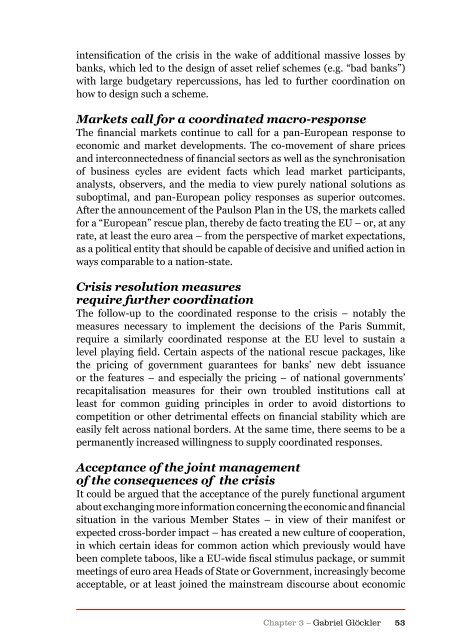Authors Iain Begg | Gabriel Glöckler | Anke Hassel ... - The Europaeum
Authors Iain Begg | Gabriel Glöckler | Anke Hassel ... - The Europaeum
Authors Iain Begg | Gabriel Glöckler | Anke Hassel ... - The Europaeum
Create successful ePaper yourself
Turn your PDF publications into a flip-book with our unique Google optimized e-Paper software.
intensification of the crisis in the wake of additional massive losses by<br />
banks, which led to the design of asset relief schemes (e.g. “bad banks”)<br />
with large budgetary repercussions, has led to further coordination on<br />
how to design such a scheme.<br />
Markets call for a coordinated macro-response<br />
<strong>The</strong> financial markets continue to call for a pan-European response to<br />
economic and market developments. <strong>The</strong> co-movement of share prices<br />
and interconnectedness of financial sectors as well as the synchronisation<br />
of business cycles are evident facts which lead market participants,<br />
analysts, observers, and the media to view purely national solutions as<br />
suboptimal, and pan-European policy responses as superior outcomes.<br />
After the announcement of the Paulson Plan in the US, the markets called<br />
for a “European” rescue plan, thereby de facto treating the EU – or, at any<br />
rate, at least the euro area – from the perspective of market expectations,<br />
as a political entity that should be capable of decisive and unified action in<br />
ways comparable to a nation-state.<br />
Crisis resolution measures<br />
require further coordination<br />
<strong>The</strong> follow-up to the coordinated response to the crisis – notably the<br />
measures necessary to implement the decisions of the Paris Summit,<br />
require a similarly coordinated response at the EU level to sustain a<br />
level playing field. Certain aspects of the national rescue packages, like<br />
the pricing of government guarantees for banks’ new debt issuance<br />
or the features – and especially the pricing – of national governments’<br />
recapitalisation measures for their own troubled institutions call at<br />
least for common guiding principles in order to avoid distortions to<br />
competition or other detrimental effects on financial stability which are<br />
easily felt across national borders. At the same time, there seems to be a<br />
permanently increased willingness to supply coordinated responses.<br />
Acceptance of the joint management<br />
of the consequences of the crisis<br />
It could be argued that the acceptance of the purely functional argument<br />
about exchanging more information concerning the economic and financial<br />
situation in the various Member States – in view of their manifest or<br />
expected cross-border impact – has created a new culture of cooperation,<br />
in which certain ideas for common action which previously would have<br />
been complete taboos, like a EU-wide fiscal stimulus package, or summit<br />
meetings of euro area Heads of State or Government, increasingly become<br />
acceptable, or at least joined the mainstream discourse about economic<br />
Chapter 3 – <strong>Gabriel</strong> Glöckler 53

















